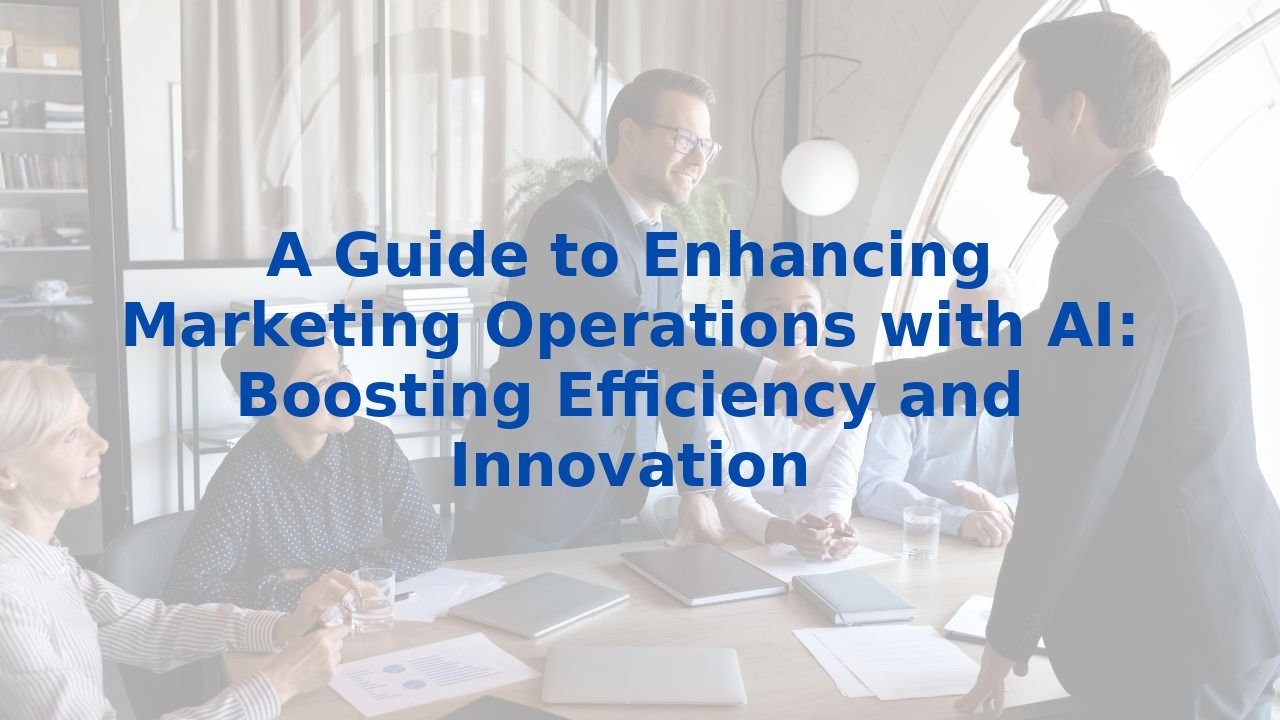A Guide to Enhancing Marketing Operations with AI: Boosting Efficiency and Innovation
A Guide to Enhancing Marketing Operations with AI: Boosting Efficiency and Innovation
In today's fast-paced business environment, marketing operations are crucial to the success of any organization. The integration of Artificial Intelligence (AI) into these operations is no longer a futuristic concept; it's a present-day reality that unlocks a world of possibilities in streamlining processes, enhancing efficiency, and driving innovation. Let's explore how AI can significantly improve marketing operations, elevating your organization to new heights.
Understanding Marketing Operations
Marketing operations involve a variety of activities aimed at executing and optimizing marketing strategies. These processes could include data analysis, campaign management, content creation, and customer engagement. Effectively managing these operations is vital for delivering targeted campaigns, measuring their impact, and enabling data-driven decision-making.
The Role of AI in Marketing Operations
AI transcends traditional marketing paradigms by empowering organizations with tools that automate repetitive tasks, enhance decision-making, and provide improved customer engagement. Here are some pivotal ways in which AI is enhancing marketing operations:
1. Data Analysis and Insights
AI possesses unparalleled capabilities in processing massive datasets quickly, yielding insights that were once out of reach. In the realm of marketing, comprehending consumer behavior is fundamental to crafting compelling campaigns. AI can sift through customer data to uncover trends, preferences, and patterns, thereby enabling marketers to tailor their strategies to resonate more effectively with their audience.
2. Automating Repetitive Tasks
Automating mundane tasks stands as one of the primary advantages of AI in marketing operations. From data entry to content generation and campaign management, AI can shoulder these responsibilities, allowing marketers to divert their time and focus towards strategic development and creative problem-solving. This not only boosts efficiency but also fosters a culture where innovation thrives.
3. Personalized Customer Engagement
The advent of AI-driven tools allows marketers to analyze customer interactions and preferences at an unprecedented level. By facilitating personalized marketing efforts, organizations can build stronger customer relationships, leading to increased satisfaction and loyalty. For example, AI-powered chatbots offer timely responses to customer inquiries, enriching the overall customer experience and enhancing engagement.
4. Predictive Analytics
Another significant contribution of AI lies in its predictive analytics capabilities. These tools equip marketers with the ability to forecast future trends and demands, enabling proactive adjustments to inventory levels and marketing strategies. By anticipating customer needs and preferences, businesses can navigate potential risks and seize opportunities with confidence.
Benefits of AI for Improving Efficiency
Integrating AI into marketing operations yields numerous benefits that streamline efficiency while igniting innovation:
- Improved Decision-Making: Empowered by AI-driven insights, marketers can make informed decisions founded on real-time data. This shifts organizations toward a culture of reflective decision-making that thrives on accuracy.
- Enhanced Productivity: With AI shouldering repetitive tasks, teams can channel their energies towards higher-value activities, driving productivity across the board.
- Cost Reduction: Automating processes and enhancing operational efficiency translates into significant cost savings. As organizations save on manual labor and processing, they gain the ability to reallocate resources toward innovation and growth.
The Importance of Training Employees for AI
While AI heralds a transformative leap in marketing operations, its full potential can only be realized when organizations invest in robust employee training. Here’s why:
“The technology is only as powerful as the people who wield it.”
- Skill Development: Equipping employees with AI proficiency enhances their capabilities, ensuring they can leverage AI tools effectively. A knowledgeable workforce is essential where human judgment and creativity are intertwined with technology.
- Adoption and Integration: Proper training fosters seamless integration of AI into existing workflows. This boosts adoption rates and ensures that employees can harness the full capabilities of AI in their day-to-day operations.
- Ethical Considerations: Training also addresses crucial ethical aspects of AI. Employees must understand how to use AI responsibly, ensuring the integrity and accuracy of the data being utilized.
Conclusion
The integration of AI into marketing operations stands as a transformative trend poised to redefine how organizations operate. By automating routine tasks, enhancing decision-making, and delivering personalized customer experiences, AI fosters efficiency and ignites innovation. However, realizing AI's full potential hinges on an investment in employee training. By prioritizing skill development and guaranteeing seamless integration of AI into workflows, businesses can reap unparalleled benefits and maintain their competitive edge in the dynamic world of marketing operations. Explore comprehensive AI training options to equip your entire workforce with the skills needed to thrive in this era of innovation.



